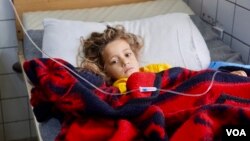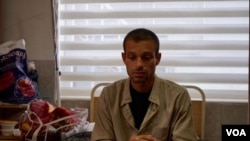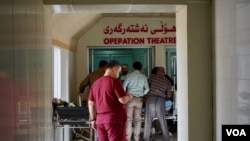Three-year-old Noor whimpers even before the surgeon starts gently lifting the coarse wool blanket to reveal her heavily bandaged leg. Her aunt watches as the blond-haired toddler complains, pleading with him to stop
Just hours ago he operated on her — her fourth surgery in two weeks. This time the director of the Emergency Management Center in Irbil hopes he's saved her leg, crushed in an air strike on a village south-east of Mosul, the city that Iraqi forces are trying to recapture from Islamic State. When she hears a plane flying overhead she turns to her aunt, crying, "I'm afraid."
The chief nurse, 47-year old Rauf says the situation makes him want to scream. "But that won't help her — I try to divert her attention, make her laugh, and take her mind off of her injures," he said. Asked whether he finds his work depressing, he responds, "No, I love my job."
In recent days more civilian casualties have started to arrive from the Mosul battle front at the Emergency Management Center, a one-story structure built around a courtyard where the breeze rustles red and white roses and purple Bougainvillea. The 60-bed clinic was founded by an Italian non-profit in 1998 but now it is run by a local Kurdish foundation and funded as best as the cash-strapped Kurdistan Regional Government can manage.
'We are short of beds'
"Since the Mosul offensive started, on some days we get a hundred patients in one go," says the clinic's director and top surgeon Dr. Rawand Musheer Haweizy. "We are short of beds," he adds.
On Tuesday morning, he oversaw three operations. Strict triage helps his team to focus on the most imperiled with the less severely injured dispatched quickly to the emergency rooms of the three general hospitals in the Iraqi Kurdistan's capital.
"We treat only war-related wounds — regardless of of race and religion. We are treating Iraqis, Kurds, jihadists, soldiers and civilians. I don't ask who they are. I want to save lives and limbs and, of course, we are getting Islamic State fighters but anyone who comes here will be treated," the director says emphatically.
He has a team of seven general and four orthopedic surgeons and they are in desperate need of more drugs and medical equipment — even surgical kits. "We are receiving about 40 percent of what we need. We are even short of bandages and dressings," he laments.
Not all limbs can be saved
"We are seeing bullet wounds to head and chest — all over the body in fact. A lot of our patients have been wounded in explosions caused by mines and shelling and we are seeing severe injuries to limbs. We aim to stabilize our patients, we can save the limbs 90 percent of the time, if the fractures are simple but it is harder if the fractures are complicated or if there is severe soft-tissue damage and if the nerves have been severed. But even with severe injury we can sometimes reconnect and reconstruct," he explains.
But not all limbs can be saved.
Thirty-six-year-old Abbas, a Kurdish policeman, was shot by IS fighters in a village west of Kirkuk during an IS offensive Saturday, leaving his right leg terribly fractured. "I told the surgeon that my leg was totally numb and he might as well cut it," says Abbas. The surgical team tried to save Abbas' leg anyway, but in vain. The policeman is scheduled for an amputation later this week.
In another ward, 38-year-old Ibrahim explains haltingly that IS fighters shot him in the leg when they discovered that his brother was in the Iraqi army. He says in his village the militants killed many women and children in the final days before they lost control of the settlement to Iraqi forces.
The clinic's surgeons have done as much as they can for him and he will need months of treatment and a series of reconstructive operations at a private clinic in Irbil but the treatment will cost $4,500 and he doesn't have the money.
"I have lost everything, all my possessions," says. "Tell people about me," he asks.
Hospital system is buckling
In an adjacent bed, Eid Jasm, 36, describes stoically how he lost his wife and two young children to an improvised explosive that also injured him, in a village south-east of Mosul. The surgeons have fixed a plate in his left leg and pins are now sticking out of it. He nods briefly when people console him over his wife and children and has the same bewildered expression on his face as most of the patients here as they struggle to come to terms with what fate has handed them.
Kurdistan Regional Government officials say their hospital system is buckling under immense strain and they are appealing to the U.N. and international NGOs for help. They are operating two mobile hospitals close to the Mosul front lines. They are also worried about infectious diseases, including hepatitis, being carried into the general population by refugees and their children, who under IS rule have not received any vaccinations for two years.
They are cagey about the number of casualties — especially peshmerga soldiers killed or wounded fighting on the outskirts of Mosul. But refugees say civilian casualties are rising rapidly, including from Iraqi and coalition airstrikes.
Ali, aged 44, fled the village of Gogjali, right on the threshold of Mosul, Monday night. "The Golden Division (an Iraqi unit) came and ordered us out saying there would be airstrikes. As we left, three houses were hit and all the families were killed," he told VOA.













